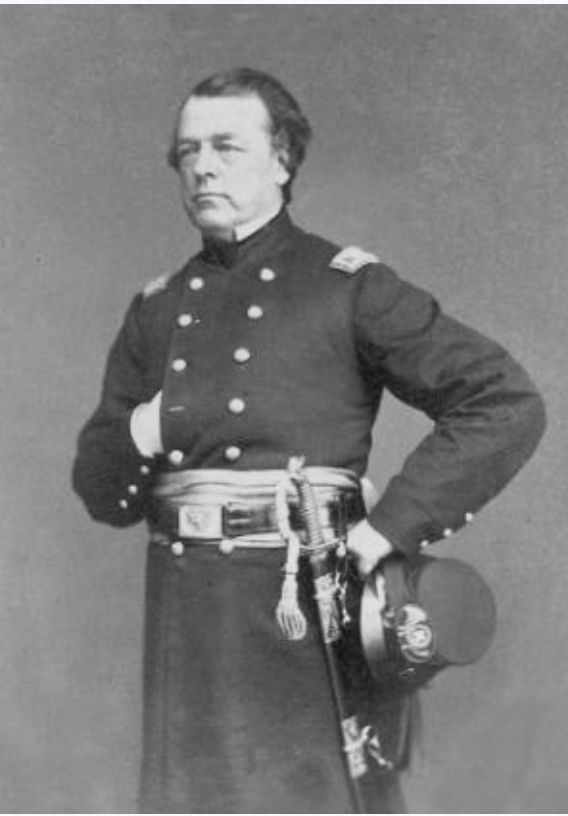Edgar Mantlebert Gregory
Edgar Mantlebert Gregory was born on January 1, 1804, in Sand Lake, New York, to Justus Gregory and Clarissa Downs. His father was a minister and the descendant of early New England colonists. Gregory grew up in New York, and he married Ellen R. Young there sometime in the 1820s. They had at least three children: Francis, born around 1828; Justus, born around 1831; and Sarah, born around 1834. The family moved to Cincinnati sometime in the 1830s, and Gregory earned a living as a lumber merchant and railroad developer. He was an active member of the American Missionary Society and the American Bible Society, and according to family tradition, he helped African Americans escape to freedom as part of the Underground Railroad.
Gregory joined the Union army in August 1861 and received a commission as colonel of the 91st Pennsylvania Infantry. He took part in the Battles of Fredericksburg, Chancellorsville, Gettysburg, Cold Harbor, the Siege of Petersburg, and the Appomattox Campaign. He was brevetted brigadier general in the fall of 1864 for “gallant and distinguished service” during the Battle of Poplar Springs Church. He was later brevetted major general for “gallant conduct” in the Battle of Five Forks. His regiment mustered out in July 1865.
Gregory was a staunch abolitionist, and after the war, he became the assistant commissioner of the Freedmen’s Bureau in Texas. He toured the plantations of eastern Texas and reported incidents of “downright murder, savage beatings, [and] merciless whippings.” Gregory helped negotiate labor contracts between freedpeople and former slaveholders, and he urged United States soldiers to enforce the contracts. He also oversaw the construction of schools and churches, and he defended African Americans’ right to “purchase and own any kind of property that a white man could.” Despite Gregory’s “limited funds,” one historian observes, “Gregory attempted to stabilize the labor system, emphasized freedpeople’s civil rights, and made brief beginnings in the educational field.”
According to contemporary observers, Gregory was “well hated by the Rebs” and was “very unpopular” among white Texans. President Andrew Johnson removed Gregory from the state in 1866. He spent 1867 as a Freedmen’s Bureau commissioner in Maryland, where he helped fund the construction of schools for African Americans. He eventually settled in Philadelphia, and he served as a United States Marshal under President Ulysses S. Grant. He died in Philadelphia on November 13, 1871.
DATABASE CONTENT
| (531) | Gregory, Edgar Mantlebert | 1804-01-01 | 1871-11-07 |
- Conflict Side: Union
- Role: Soldier
- Rank in: Colonel
- Rank out: Colonel
- Rank highest: Colonel
- Gender: Male
- Race: White
Documents - Records: 1
- (1543) [writer] ~ Edgar M. Gregory to Justus A. Gregory, 18 April 1865
People - Records: 1
- (5025) Gregory, Justus A. is the [child of] (531) Gregory, Edgar Mantlebert
Places - Records: 2
Regiments - Records: 1
- (140) [officer] ~ 91st Pennsylvania Infantry
Groups - Records: 1
- (3) [member/supporter] ~ Republican Party
SOURCES
“Edgar M. Gregory,” Wikipedia article, available from Wikipedia.org; Barry A. Crouch, The Freedmen’s Bureau and Black Texans (Austin, TX: University of Texas Press, 1999); Linda K. Kerber, No Constitutional Right to Be Ladies: Women and the Obligations of Citizenship (New York, NY (Farrar, Straus and Giroux, 1999); 1850, 1860, and 1870 United States Federal Censuses, available from Ancestry.com; Civil War Soldier Records and Profiles, 1861-1865, available from Ancestry.com.





